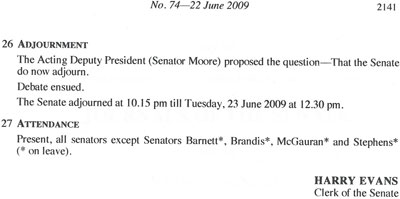43 Publication of Journals and records
-
All proceedings of the Senate shall be recorded by the Clerk in the Journals of the Senate, shall be signed by the Clerk and, except in so far as they relate to a meeting of the Senate in private session, be published.
-
Business before the Senate shall be placed on the Notice Paper in accordance with the standing orders, and the Notice Paper shall be published.
-
Publication of the record of debate in the Senate, known as Parliamentary Debates and Hansard, is authorised by this standing order.
Amendment history
Adopted: 19 August 1903 as SO 39 (corresponding to paragraph (1) in part)
Amended:
- [12 May 1993, J.123 (order of continuing effect authorising the electronic and other publication of Hansard)]
- 13 February 1997, J.1447 (to take effect 24 February 1997) (incorporation of paragraph (2), a previously unimplemented recommendation of the Procedure Committee, and paragraph (3), formerly an order of continuing effect)
1989 revision: Old SO 40 renumbered as SO 43; addition of explicit authority to publish the Journals and proviso applying to private meetings

The Clerk of the Senate is responsible for producing the Journals of the Senate, a formal record of decisions taken
Commentary
The Journals of the Senate are the official record of proceedings, kept by the Clerk. Several standing orders require or permit particular information to be recorded in the Journals, including:
-
the attendance of senators for the purpose of s.20 of the Constitution (SO 46)
-
the names of senators present when the Senate is adjourned for want of a quorum (a “count out” – SO 52(6))
-
the name of one senator whose call for a division is unsupported (SO 100(1))
-
the names of senators voting in divisions (SO 102(3)).
See Odgers’ Australian Senate Practice, 14th edition, for other matters recorded in the Journals and a description of their production.
Like other parliamentary publications including the Notice Paper and Hansard, the Journals were originally published by the Government Printer.[1] The Parliamentary Papers Act 1908 provided absolute privilege for publication by the Government Printer of reports of the debates and proceedings in either House.[2] In 1987, the Parliamentary Privileges Act was passed, providing, in paragraph 16(2)(d), that the publication of a document “by or pursuant to an order of a House” is part of proceedings in Parliament and therefore absolutely privileged. While ever the Journals were published only by the Government Printer, they were absolutely privileged under the 1908 Act. When the Parliament moved to the new Parliament House in 1988, however, enhanced computer capacity provided for publication of the Journals and other parliamentary documents on an in-house database, accessible from individual personal computers throughout the building. Questions arose as to the status of publication in this form.
When the standing orders were revised in 1989, explicit authority to publish the Journals was added to SO 43. This meant that publication in any form would be covered by the protection in paragraph 16(2)(d) of the Parliamentary Privileges Act 1987 (noting that the definition of “document” in the Acts Interpretation Act 1901 also included electronic documents). This protection therefore extended more widely than the protection afforded by the Parliamentary Papers Act 1908. At the same time, automatic authority to publish raised the question of in camera meetings of the Senate and an exception was therefore provided for the record of proceedings in private session.
With the development of the internet in the early 1990s, the possibility arose of providing access by external subscribers to the parliamentary databases. This development raised the same issues as electronic publication of the Journals and led to the passage by each House in 1993 of a resolution of continuing effect authorising the publication of Hansard, to cover any future publication other than by the Government Printer.[3] In any case, the Government Printer was privatised in the mid 1990s and ceased to exist as such.[4]
The Procedure Committee also examined the publication of the Notice Paper and, in its Third Report of 1995 (PP No. 477/1995), recommended the addition of what is now paragraph (2). The committee noted the issue of electronic publication of Hansard which had led to the passage of the order of continuing effect in 1993. Questions had also been raised about the privilege attaching to questions on notice which were published in the Notice Paper and this had drawn attention to the fact that there was no general authorisation for its publication. The committee noted that there was a slight risk that legal action could be taken in respect of a question on notice placed on the Notice Paper and that uncertainty could arise because of the lack of a general authorisation to publish it. The report continued:
Other items placed on the Notice Paper are covered by parliamentary privilege because their addition to the Notice Paper occurs as part of proceedings in the Senate. Notices of motion, for example, are given orally in the Senate, and their publication in the Notice Paper is incidental to the proceedings in the Senate. Questions on notice, which were originally given orally in the chamber, do not arise in the same way, and therefore the privilege attaching to their publication in the Notice Paper may be in doubt.[5]
The report was one of several not acted upon before the 1996 election but in its First Report of 1996 (PP No. 194/1996), the committee recommended the incorporation in standing orders of a number of orders of continuing effect and of changes recommended in previous reports. These changes were adopted on 13 February 1997, with effect from 24 February 1997.